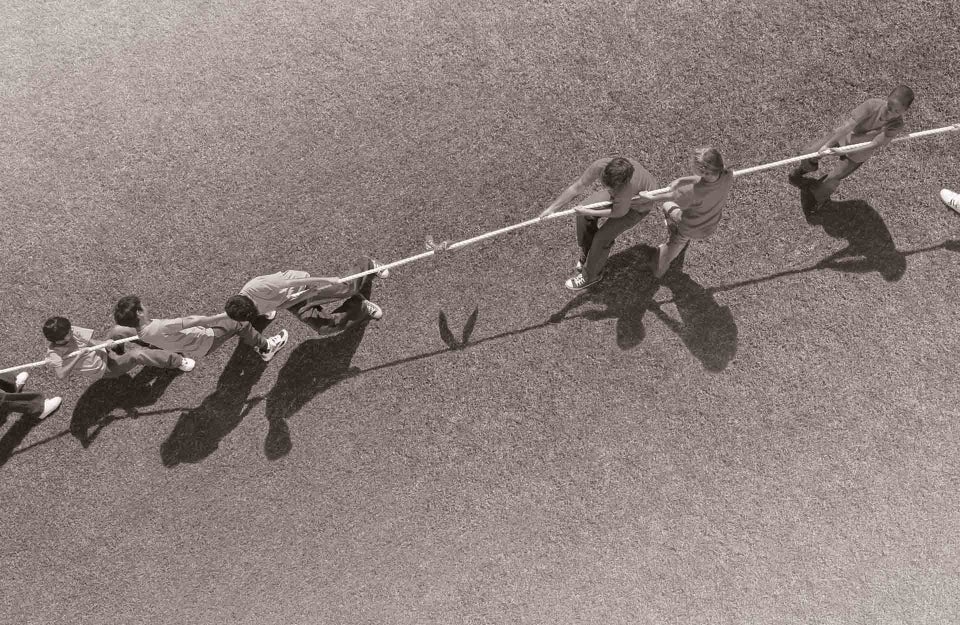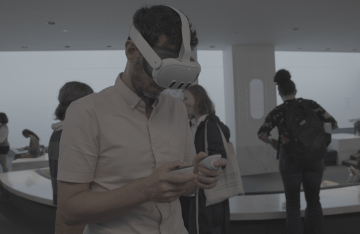Democrats and Republicans Dislike Each Other Far Less Than Most Believe
A new study indicates that some of our political polarization is based on unfounded beliefs.

- Democrats and Republicans dislike and dehumanize one another roughly equally.
- At least 70% of both Republicans and Democrats overestimated how much the other group disliked and dehumanized their group.
Political polarization is a well-documented issue in the United States, and the schism between left and right can sometimes feel impossible to overcome. But a new study from the Peace and Conflict Neuroscience Lab (PCNL) at the Annenberg School for Communication and Beyond Conflict may offer some hope for the future.
Often, people’s actions towards a group they are not part of are motivated not only by their perceptions of that group, but also by how they think that group perceives them. In the case of American politics, this means that the way Democrats act toward Republicans isn’t just a result of what they think of Republicans but also of what they think Republicans think of Democrats, and vice versa.
The study, published today in the Proceedings of the National Academy of Sciences (PNAS), found that Democrats do not dislike or dehumanize Republicans as much as Republicans think they do, and Republicans do not dislike or dehumanize Democrats as much as Democrats think they do. This finding could indicate that some of our political polarization is based on unfounded beliefs.
“There is strong, toxic polarization that exists in America,” says postdoctoral fellow and lead author Samantha Moore-Berg, “but is that due to how people actually feel about each other? Or is it due to how we think other people feel about us? We do dislike each other, but not nearly as much as we think we do.”
Composed of two studies (including one nationally representative sample), this research compared actual perceptions held by Democrats of Republicans and by Republicans of Democrats to assess how each group thought the other group viewed them. The researchers found that Democrats and Republicans disliked and dehumanized one another roughly equally, and that at least 70% of both Republicans and Democrats overestimated how much the other group disliked and dehumanized their group.
This overestimation can have severe consequences. The study found that things like not wanting to associate with people from the other group and supporting policies that flout democratic norms — like gerrymandering districts or shutting down the other political party’s news outlets — just to gain a “win” for their own group are linked to an overestimation of the other group’s disliking/dehumanizing your group.
“Democrats and Republicans both think that the hostility between them is more than twice what it actually is.” PCNL director and senior author Emile Bruneau says. “It’s depressing that we’re all caught in this mutual illusion, but it’s oddly democratizing at the same time. Overcoming these false perceptions is a shared challenge that all Americans have to face together. The optimist in me sees that as a possibility for unity.”
Based on previous PCNL research, Bruneau believes that helping Americans to realize that the partisan gap is not as wide as they perceive it to be, and that members of the other political party do not dislike them nearly as much as they perceive, can help encourage actions that facilitate a more democratic political environment and discourage actions that further polarize our society.
“This study highlights an opportunity to take action and address the factors that drive us apart. Based on this research, we outline a series of policy recommendations that can be found in America’s Divided Mind, a report that offers actionable recommendations to bridge the political divide in the U.S.,” explains Tim Phillips, CEO of Beyond Conflict. The report is part of a partnership between Beyond Conflict and PCNL to translate this socially relevant research and bring it into the real world.
In addition to Moore-Berg and Bruneau, other authors on the study include Lee-Or Ankori-Karlinsky of Beyond Conflict, and PCNL postdoctoral fellow Boaz Hameiri.



